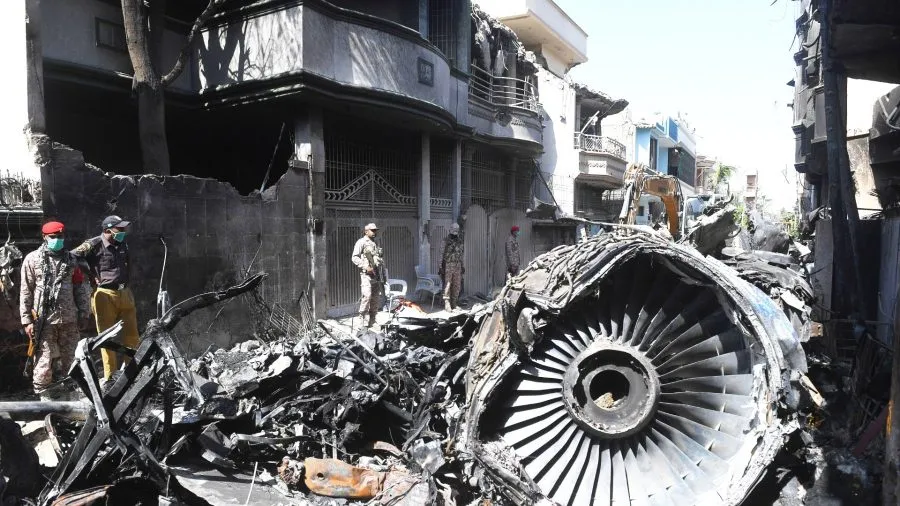
Pakistan arrests over fake pilot licence scandal
Jan 29, 2021

In Pakistan, a significant scandal involving fake pilot licenses has led to widespread arrests across the aviation sector. Authorities have apprehended numerous individuals, including pilots and officials, implicated in the issuance of fraudulent licenses that compromised air safety. The investigation revealed that many pilots had obtained their licenses through dubious means, raising serious concerns about the integrity of the country’s aviation industry. This crackdown aims to restore public confidence and ensure compliance with international safety standards. The scandal has sparked a broader examination of regulatory practices and the accountability of aviation authorities in Pakistan.
The recent scandal involving fake pilot licenses in Pakistan has sent shockwaves through the aviation industry. This situation has not only raised concerns about public safety but has also tarnished the reputation of the country's aviation sector. The Pakistan Civil Aviation Authority (PCAA) took decisive action, leading to a series of arrests that have highlighted the severity of the issue. In this article, we will delve into the details of the scandal, the implications for the aviation industry, and the steps taken by the authorities to address this crisis.
Understanding the Fake Pilot License Scandal
The scandal came to light when investigations revealed that numerous pilots were operating with fraudulent licenses. Reports indicated that a significant number of these licenses were obtained through corrupt practices, undermining the integrity of the aviation sector. The PCAA, upon discovering these irregularities, launched an extensive investigation, which led to the arrest of several individuals, including pilots and officials accused of facilitating these illegal activities.
The Impact on Pakistan's Aviation Industry
The implications of the fake pilot license scandal are far-reaching. Not only does it pose a risk to passenger safety, but it also threatens the credibility of Pakistan's aviation sector on a global scale. Airlines operating within and outside the country face increased scrutiny, and the potential loss of business could have devastating effects on the industry. To better understand the scope of this scandal, consider the following statistics:
| Key Statistics | Numbers |
|---|---|
| Total Pilots Investigated | 400+ |
| Number of Arrests Made | 30+ |
| Licenses Cancelled | 150+ |
| Estimated Financial Impact on Airlines | $200 Million |
Government Response and Measures Taken
In response to the scandal, the Pakistan government has taken several measures to restore public trust and ensure the safety of its aviation sector. The PCAA has implemented stricter regulations regarding pilot licensing and is conducting thorough reviews of existing licenses. Additionally, the government is collaborating with international aviation bodies to enhance oversight and compliance within the industry.
Furthermore, the crackdown on fraudulent licenses is expected to continue. Authorities have pledged to pursue legal action against anyone found guilty of involvement in this scandal, signaling a zero-tolerance approach to corruption in aviation.
Public Reactions and Concerns
The public's reaction to the fake pilot license scandal has been one of outrage and disbelief. Many passengers are now questioning the safety of airlines operating within Pakistan and are concerned about the potential risks associated with flying. Social media has been abuzz with discussions about the scandal, with calls for accountability and transparency in the aviation sector. Surveys conducted post-scandal indicate a significant decline in public confidence in domestic airlines:
| Public Confidence Survey | Before Scandal | After Scandal |
|---|---|---|
| Confidence in Safety | 85% | 45% |
| Willingness to Fly with Domestic Airlines | 70% | 35% |
Future Outlook for Pakistan's Aviation Sector
The road to recovery for Pakistan's aviation sector will be challenging. Rebuilding trust among the public and restoring the international reputation of the industry will require significant effort from both the government and airline operators. Key steps for the future include:
- Implementing robust training programs for pilots and staff.
- Enhancing transparency in the licensing process.
- Increasing collaboration with global aviation authorities.
- Regular audits and assessments of airline operations.
As the PCAA continues to address the fallout from the fake pilot license scandal, the focus will undoubtedly remain on ensuring the highest standards of safety and integrity within the aviation industry.
Conclusion
The arrests made in connection with the fake pilot license scandal mark a pivotal moment for Pakistan's aviation sector. While the situation has exposed significant vulnerabilities, it has also opened the door for necessary reforms. As the industry moves forward, the commitment to safety, transparency, and accountability will be essential in regaining the trust of the public and restoring the nation's aviation reputation on the global stage.
Related Articles

Explore Thailand: The Best Islands to Visit for Paradise, Adventure, and Relaxation

The Ultimate Guide to the Best Islands in Thailand for Your Next Getaway

Do babies need passports? How to get a passport for a newborn

How to get a U.S. passport fast: here’s how to expedite the process

What is Mobile Passport Control: 5 reasons why you should use it

SENTRI vs. Global Entry: A detailed guide

Do you need a passport to go to the Bahamas? Let’s find out

Do you need a passport to go to Mexico? A detailed guide

Do you need a passport to go to Canada? We got the answer

Do You Need a Passport for a Cruise: An Essential Travel Guide

Booster Seat Requirements: All the Rules to Follow in Your Rental Car

What Are the World’s Most Powerful Passports, and How Does Yours Rank?

How to Take a Passport Photo at Home: A Helpful Guide

You've got to have heart! Southwest's new livery

Your opinion: Should water be free on low cost carriers?

Young women bolder than guys as solo travellers
